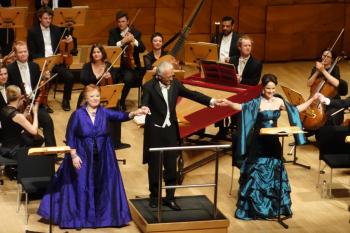Rodelinda
It’s highly unlikely I’ll ever hear all George Frideric Handel’s extraordinary output of more than 40 operas in performance, especially given that it’s taken Rodelinda almost 300 years since its premiere (at the Kings Theatre Haymarket, London, in 1725) to receive its Melbourne debut in a concert performance last Friday night. But within the contoured timber grandeur of the Elizabeth Murdoch Hall at the Melbourne Recital Centre, it was heard, and how it impressed!
Presented by the Joan Sutherland and Richard Bonynge Foundation and conducted by the legendary maestro Richard Bonynge himself, all six soloists and 23 musicians of the Melbourne Chamber Orchestra added a performance of astonishing breadth to the city’s musical credits.
The legendary Bonynge, in crisp and soldierly form, lubricated the music exquisitely, extracting smooth, precise playing from start to finish. Bonynge’s trust in his musicians and soloists was clearly apparent. There was neither a hair out of place nor a note not nurtured to its finest expression. The music never overpowered and as Bonynge’s precision-perfect musical engine chugged along, his six soloists (three to each side of him) took to their roles like well-oiled pistons, alternating in turn to drive forward arias of heartfelt emotive power.
Rodelinda is the queen of the usurped King of Lombardy, Bertarido. With her husband presumed dead in battle, Rodelinda has been robbed of her throne and is kept at the palace by the king’s usurper Grimoaldo, the Duke of Benevenuto. Though betrothed to Bertarido’s sister Eduige, Grimoaldo has fallen in love with Rodelinda, who agrees to marry him despite her grief over Bertarido’s absence (on the extraordinary proviso that her son is murdered in front of her). Her son Flavio is never murdered (he has no vocal part), Bertarido returns, thus changing the course of the story to Rodelinda’s joy, and after a series of misjudgements and trials, Bertarido and Rodelinda are reinstated to the throne after the noble Grimoaldo’s change of heart. It’s opera seria with a seriously joyous ending.
Soprano Greta Bradman, winner of the 2013 Australian International Opera Award and in the title role of Rodelinda, demonstrated regal splendour and human heart. In Rodelinda’s opening two arias of Act 1, “Ho perduto il caro sposo” and “L’empio rigor del fatto”, Bradman impressed with dramatic expressive shift from loss to determination; the heart and the queen on full display. Elegantly poised and in effortless form, Bradman mesmerised with expansive vocal range, piercing strength and accelerative agility from brave, grounded low notes to glistening highs. Later, as Rodelinda realises her husband is still alive, her Act 2 aria, “Ritorna, o caro e dolce mio tesoro”, exhibited stunning textural layering, a glassy fragility and striking gossamer-like pianissimo. The role is demanding and Bradman was clearly savouring the part all along.
Originally cast for the great castrato Senesino, Bertarido, was brought to life by mezzosoprano Fiona Janes, Artistic Director and General Manager of the JS RB Foundation. Janes embodied her character in a truly focused and meaty performance. Despite losing the throne, as Bertarido, Janes demonstrated such control and synergy with Bonynge that it was clear her king was not struck down. From her opening aria in Act 1, “Dove sei, amato bene?”, and throughout, holding a sense of vocal calm, her broad range and strong recitative delivery gave the impression there was yet more fuel in her tank to sing for hours, well after her last solid Act 3 aria, “Vivi, tiranno”. Janes demonstrated appeal as the consummate performer.
Holding the Lombardic throne, however, is Grimoaldo, imbued with vigour by tenor John Longmuir. A deserved winner of the 2011 Joan Sutherland and Richard Bonynge Bel Canto Award, Longmuir’s performance went a long way to cement his reputation as one of Australia’s rising stars of full-scale opera. With dexterous vocal aptitude, a warm bubbling fluidity and firm projection, Longmuir deftly captured the usurper’s deliberations over his love for Rodelinda, his betrothal to Eduige (Bertarido’s sister) and his reign over Lombardy. Longmuir’s emotively rich vocal range was evident as was his ability to sense his own limits as he expressed the sincerity of a character that questioned his own tyrannical rule. I found Longmuir’s Act 2 “Prigioniera ho l’alma in pena” and Act 3 “Pastorello d’un povero armento” notably compelling.
Liane Keegan, one of Australia’s finest dramatic contraltos, as if under a spell, summoned her character of Eduige with heightened passion with a fiercely resonant, rock solid vocal base supporting a thick, wintery, woolly-warm tone. And it wasn’t soon enough for the radiant, eager and very likeable Lorina Gore to make her presence known as Unulfo, Bertarido’s trusted counsellor. It was impossible not to relish in Gore’s exuberance as she charmed with her bright soprano voice, swooping like a swallow to ride and conquer every note. The accomplished Michael Lewis completed the ensemble as Garibaldo, Grimoaldo’s counsellor, in a highly expressive performance, his bass robust in recitative, a reverberant chesty voice but appearing stretched in the upper range.
The performance was an overall triumph, a gift to its audience of a Handel opera that many might hope will return to the stage, perhaps with the theatrical trimmings under a director with it.



It was a great night indeed. Was swept away by handle and the talented cast.